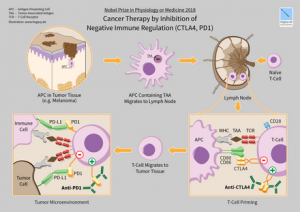
The immune system was recruited to tackle tumor cells. The survival rates of millions of cancer patients improved after receiving immunotherapy. But, the treatment method also has a drawback: only one out of five patients had a favorable outcome to treatments of this kind. Researchers at the Washington University of Medicine in St. Louis wanted to understand and address the limitations of immunotherapy. They performed an extensive research study and found that in the fight against cancer, the immune system can act as its worst enemy.
In another study, researchers investigated a subset of immune cells, that is, type 1 regulatory T cells, or Tr1 cells in mice. They found that these cells performed their normal function of preventing an overreaction of the immune system. Meanwhile, they also inadvertently suppressed the cancer-fighting power of immunotherapy. According to senior researchers at the Department of Pathology and Immunology at Washington University School of Medicine, the Tr1 cells have a heretofore character that is considered to be an unrecognized obstacle to the efficacy of immunotherapy.
It suppresses its fight against cancer. Therefore, in the mouse model, the researchers tried to circumvent this limitation. They could revitalize the cancer-fighting cells in the immune system. Thus, this finding is an important development in expanding the benefits of immunotherapy. More and more cancer patients can now avail the novel developments of immunotherapy. A detailed information of this study is available in the journal Nature.
Personalized form of immunotherapy is now available to cancer patients in the form of vaccines. Cancer vaccines are aimed at the mutant proteins, which are specific to a tumor in a patient. These vaccines encourage an attack on tumor cells by boosting the activity of killer T cells. At the same time, they allow the healthy cells to remain unaffected. In another study conducted by Schreiber’s group, it was found that helper T cells are also activated with vaccines that are more effective.
The helper T cells are another type of immune cells. They are used for recruiting and expanding the killer T cells. These cells are known to destroy tumor cells. These researchers tried to supercharge the cancer vaccine by adding an additional amount of helper T cell targets. They found that a different type of T cell was generated. This type of T cell suppressed the rejection of tumor cells.
In another study, a group of researchers laid down the following hypothesis: when the activation of helper T cells was increased, they could induce an enhanced elimination of sarcoma tumors in mice. They injected vaccines in groups of mice with tumors. These vaccines could activate the killer T cells in an equal manner and also trigger different extent of activation of helper T cells.
In their latest study, the researchers were surprised to know the activity of the vaccine. They had developed the vaccine to hyperactivate helper T cells. However, the effect of this vaccine was opposite and it suppressed the rejection of tumor cells. The researchers were of the view that the vaccine should have eliminate the sarcoma tumors in mice as it activated more and more T cells.
The vaccine contained helper T cell targets in higher doses, and this induced inhibitory activity in Tr1 cells. Thus, the elimination of tumor cells was blocked completely. In general, Tr1 cells control an immune system that is overactive. However, ours is the first study to show that they can dampen the fight against cancer. The brakes on the immune system are generally put by Tr1 cells. They prevent the immune system from attacking healthy cells of the human body. However, no previous study has investigated its role in cancer comprehensively.
Previously published data was investigated thoroughly by researchers. They found that more Tr1 cells were present in tumor patients who showed a poor response to immunotherapy treatment. The number of Tr1 cells was lesser in tumor patients who had shown a good response to immunotherapy treatment. When tumors grew bigger in size in mice, the number of Tr1 cells increased proportionately. This made the mice develop an insensitivity to immunotherapy.
Researchers wanted to bypass the inhibiting cells in mice, which were vaccinated. Therefore, they treated these mice with a drug that improved the cancer-fighting power of killer T cells. This drug was developed by Asher Biotherapeutics, which is start up in the field of biotechnology. The drug could carry out modifications in interleukin 2 (IL-2). Please note that IL-2 is a protein that boosts the activity of the immune system. The drug could specifically enhance the activity of killer T cells and reduce the toxicity associated with other treatments that do not modify IL-2.
The inhibition of Tr1 cells was overcome by the additional boost provided by the drug. Thus, the immunotherapy was found to be more effective. The lead researcher said that they are focusing on providing personalized immunotherapy and widening the efficacy of the treatment. The researchers said that in order to attain the most robust anti-tumor response, they had to understand how to trigger the immune system. For this purpose, they referred to related studies in recent decades. These studies investigated the basic immunology of the tumor. In our current study, the main aim of researchers was to improve the immunotherapy and to benefit more patients with cancer.
